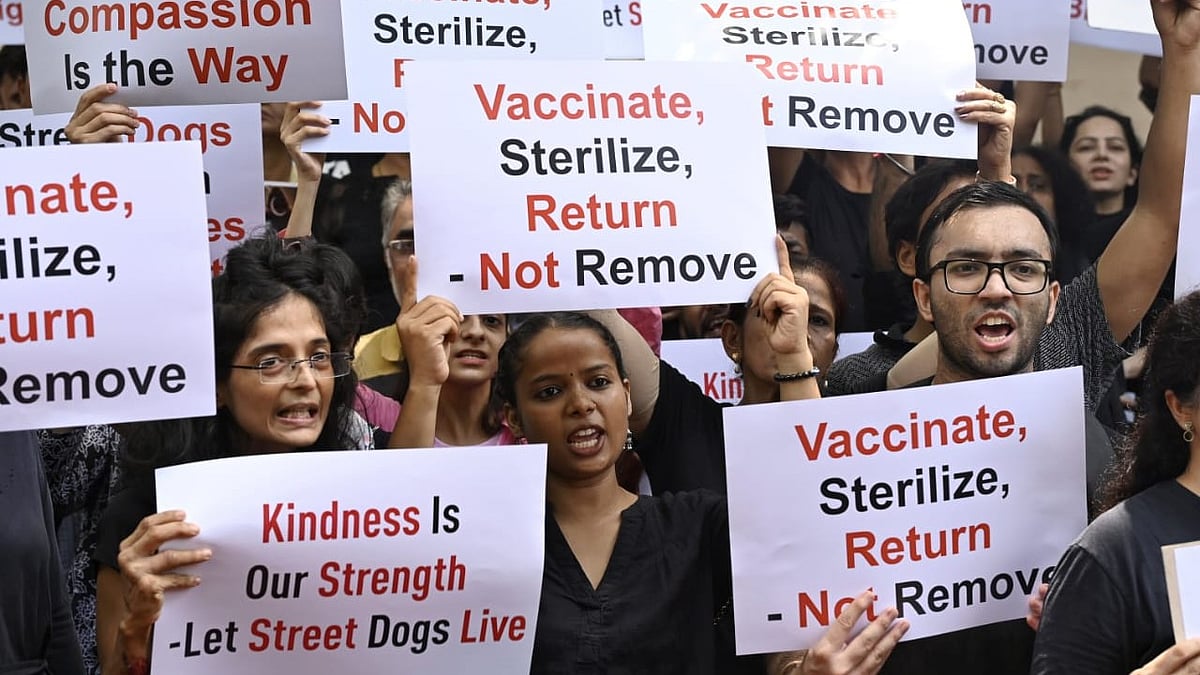Nation
Dogs will come back to their streets: Supreme Court rolls back order
To the jubilation of animal lovers in the NCR, the court has reversed its 11 August order to put all stray dogs into shelters for life

To the considerable relief of animal rights activists and dog lovers of Delhi NCR, the Supreme Court has now — on 22 August, Friday — stayed its earlier 11 August direction to the MCD, NDMC and municipal authorities of Gurgaon and Noida to capture and hold street dogs in shelters after vaccination and sterilisation.
Today's order reiterates the existing Animal Birth Control (ABC) Rules, which said dogs which are picked up must be released after sterilisation and immunisation — but with a caveat: those infected with rabies or exhibiting aggressive behaviour are to be retained. (The earlier rules also kept and observed rabies-infected animals for a number of days.)
In the earlier order of 11 August, a different two-judge bench of the Supreme Court had ordered the authorities in the National Capital Territory (NCT) of Delhi to start picking up stray dogs from all localities "at the earliest" and relocate them to dog shelters, with additional directions that more such shelters — enough to hold at least 5,000 dogs — must be set up within 6-8 weeks.
It was accompanied by a stern warning to animal activists that any obstruction of this order would be viewed as contempt of court and strict action taken.
This did not quell the wave of protests — not just across the NCR, but across India, with animal welfare activists calling for more humane solutions as well as practically feasible ones. After all, actually holding and feeding lakhs of strays, with the required number of staff and daily meals and the space and upkeep, costs far more than actually stocking all health centres with anti-rabies vaccine and taking care of immunisation and vaccination of the street dogs.
Published: undefined
Many a celebrity, politician and NGO sent petitions to the Chief Justice of India as a last resort.
And finally, CJI B.R. Gavai agreed to “look into the matter”, setting up a special three-judge bench to hear the suo motu case.
On 14 August, the last hearing, the new bench had still reserved its order, however, even as rounding up of animals began, to the despair and distress of animal lovers and neighbourhood feeders — who very typically stepped in where the local governments had all but abdicated responsibility, paying out of pocket to sterilise and immunities the community dogs. This reality, of the municipal authorities' neglect, was in fact underscored by the court.
And now, acknowledging the need for a "holistic approach", the three-judge bench has lifted the prohibition on the release of captured strays and pledged that a fresh national policy shall be put out soon.
Until then, the neighbourhood canines are to be vaccinated, sterilised, dewormed and sent back to the same territory they were collected from, as was the rule before.
Only those dogs that exhibit aggressive behaviour or those confirmed as having rabies shall be treated and still held back at shelters. So the creation of more shelters and pounds remains imperative still, per the court.
Of course, the loophole that remains in this order is the definition of 'aggressive' and the source of that definition remain a tad unclear — does it need a formal complaint or a bite incident on record before the capture? After all, no dog is likely to come happily and quietly while being pulled about by (aggressive) strangers!
Published: undefined
It is also unclear what is to prevent unhappy members of a community from putting in false complaints of aggression.
Another change from earlier practice, however, will concern feeders as well: The Supreme Court has now declared it 'illegal' to feed stray dogs on the streets or in public places as it causes "great difficulties for the common man walking on the streets" — in contradiction of earlier rules, again.
The rules until now demanded that the local RWA or neighbourhood associations were to be in charge of designating feeding points in association with community caregivers. Now, the court has directed that the designation of feeding spaces is to be done by the Municipal authorities of each ward.
This, again, leaves the animals and feeders at the mercy of the often not-too-knowledgeable officials who refuse to understand or acknowledge that dogs are territorial animals and have to be fed in their own area, if unnecessary aggression is to be avoided. However, the Supreme Court has said that, regardless, "Under no condition shall the feeding of stray dogs on the streets be permitted."
The other disappointing bit for some animal activists will be the passing on of the financial burden of these orders on to animal lovers and NGOs — and not the municipalities.
For the court has ordered that each individual and each organisation that has approached the court must now deposit a sum of Rs 25,000 and Rs 2 lakhs, respectively, with the Supreme Court — failing which they shall not be allowed to appear in the matter any further.
Published: undefined
The amount collected will be utilised for the creation of infrastructure and facilities for stray dogs by the respective municipal bodies, the order says — which does seem to suggest that the court's change of stance is only because welfare activists protested, and not because it is the scientifically and statistically sound approach, or the just one.
Animal lovers and community feeders may also ask the authorities for adoption of specific animals, which shall be tagged accordingly, the court order.
And now, following this interim order, all cases on similar matters pending before high courts and local courts are to be transferred into this one case for the final policy to be decided.
Published: undefined
Follow us on: Facebook, Twitter, Google News, Instagram
Join our official telegram channel (@nationalherald) and stay updated with the latest headlines
Published: undefined